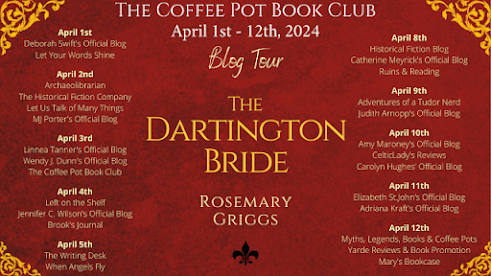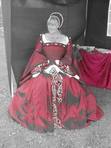Judith Arnopp's Blog, page 7
June 12, 2024
The Coffee Pot Book Club presents: Shire's Union Trilogy by Richard Buxton

Book Title: Trilogy consisting of:
Whirligig (Book #1)
The Copper Road (Book #2)
Tigers in Blue (Book #3)
Series: Shire’s Union
Author: Richard Buxton
Publication Date:
WG = 22/3/2017
TCR = 26/7/2020
TIB = 8/12/2023
Publisher: Ocoee Publishing
Page Length:
WG = 479
TCR = 421
TIB = 424
Genre: Historical Fiction

Whirligig (Book #1)
The Copper Road (Book #2)
Tigers in Blue (Book #3)
by Richard Buxton
Shire leaves his home and his life in Victorian England for the sake of a childhood promise, a promise that pulls him into the bleeding heart of the American Civil War. Lost in the bloody battlefields of the West, he discovers a second home for his loyalty.
Clara believes she has escaped from a predictable future of obligation and privilege, but her new life in the Appalachian Hills of Tennessee is decaying around her. In the mansion of Comrie, long hidden secrets are being slowly exhumed by a war that creeps ever closer.
The Shire’s Union trilogy is at once an outsider’s odyssey through the battle for Tennessee, a touching story of impossible love, and a portrait of America at war with itself. Self-interest and conflict, betrayal and passion, all fuse into a fateful climax.
Written by award winning author Richard Buxton, the Shire’s Union trilogy begins with Whirligig, is continued in The Copper Road, and concludes with Tigers in Blue.

Read an excerpt from Tigers in Blue
Giles County, Tennessee – November 1864
Their train stopped again. The three of them disembarked and walked beyond the engine. It had pulled up a handful of crossties before a fire-blackened and wounded trestle bridge that spanned a deep and wide ravine. There must have been three hundred men or more working on the repairs. They swarmed over the bridge, a busy blue infestation, some out along the incomplete top span, others either end of a crane carried on a flatbed railcar, many more perilously among the posts and cross-struts. Men struggled to shout instructions over a chorus of hammer and saw. Way down in the ravine and across a swift creek stood a clump of engineer officers. One held a sheet of paper so big he looked in danger of being lifted into the air. Others pointed and gestured up at the bridge. As Shire watched, a steam winch puffed into action on the crane-car and a thick trestle rose and swayed up from below like a miracle, before being claimed by many hands and dragged into the great puzzle of wood. Despite their industry, the nearer half of the bridge was missing the top forty feet.
The engine driver came and stood beside them, wiping sooty hands on a dirty rag. Rice, greasy hair pushed back off his forehead, asked, ‘If you knew the bridge was broke, why did you set out? We’ll be stuck for days.’
The driver took his time surveying the works. ‘Well,’ he said, ‘you’re welcome to climb down and up the other side, but any trains that happen along from Nashville will only queue up to go south. Watch a while.’ He turned to walk back to his engine. ‘These people will have us over before nightfall.’
With nothing to do but wait, Shire and Tuck left Rice at the engine and worked their way along the top of the ravine to a spot where they could watch the repair. The ground fell steeply away before them. Predictably, Tuck dropped his pack, took up his fiddle and sat. He hadn’t said a word today. A stiff breeze struck up under a gray sky. At least they had the car to retreat to if it came on to rain. Shire got out his dog-eared map of Tennessee and Kentucky and unfolded it carefully so as not to bring on further dishevelment. He found Pulaski and traced the rail line to Nashville via Columbia. Short of Franklin he found Spring Hill. They would pass right by. Clara had been full of dubious enthusiasm for her move when he’d left her. What would have changed since? He wouldn’t need the train to stop again to be certain how he felt. That question had always been for her, though he wondered if she’d answered it quietly to herself a long time ago.
He folded his map away and got busy with a fire. In the army it paid to eat when the opportunity presented itself. ‘I’ll cook your pork. We ate mine yesterday,’ he said. They often shared rations. That way if one of them got a runt portion the hardship was shared too.
There was no response from Tuck. Sometimes it was like living with an elderly relative whose mind had been misplaced. In his own time, Tuck bowed into a slow waltz, utterly at odds with the exertions of the bridge builders. Evidently, it carried on the wind into the ravine and on to those high on the bridge, as not a few faces turned their way. There was a moment’s lull in the hammering before it stuttered up again. Two men on the flatbed end of the crane-car moved elegantly into closed hold and took a turn or two before their corporal beat them apart with his hat. Shire smiled but saw Tuck was too far inside his tune to take it in.
Once he had the fire going, he dug in Tuck’s pack for the salt belly-pork they’d been doled out back in Athens. It was a mess in there. An apple long past saving, percussion caps loose that should have been in a box, a lone dollar bill left to its own devices. The string hadn’t been tied properly on the pork paper. The exposed meat had picked up a covering of cotton threads and other miniature detritus. Shire reasoned it would cook off in his small skillet. Tuck’s ration was more than ample, so he cut off two-thirds and put it to cook slowly, not too close to the heat so that the fat would stay aboard. He wrapped the remains with care and was finding a safe corner back in Tuck’s pack when he happened on something round and hard. He drew out an enamel doorknob.
He recognized it. Tuck kept it as a grim reminder of his parents who were burned alive in their farmhouse, Tuck’s home. The enamel was scorched on one side, a smooth, mute witness to their murders. He’d been about to look for some wild onion or anything that might flavor the meat, but instead he took the doorknob and went to sit next to Tuck.
He didn’t expect to be acknowledged, but the lack irked Shire all the same. The waltz looped around and around. Shire could have sworn some of the hammering was striking out one, two, three… one, two, three. ‘I think you’re slowing down their industry,’ he said.
Tuck played on. Shire felt a bubble of anger pop inside.
WG: https://books2read.com/u/3GP7AO
https://www.barnesandnoble.com/w/whirligig-richard-buxton/1130891070
TCR: https://books2read.com/u/b5JRvR
TIB: https://books2read.com/u/mVnXaA
Trilogy Amazon Buy Links:
US: https://www.amazon.com/dp/B08CDXDZDB
UK: https://www.amazon.co.uk/dp/B08CDXDZDB

Richard lives with his family in the South Downs, Sussex, England. He completed an MA in Creative Writing at Chichester University in 2014. He has an abiding relationship with America, having studied at Syracuse University, New York State, in the late eighties. He travels extensively for research, especially in Tennessee, Georgia and Ohio, and is rarely happier than when setting off from a motel to spend the day wandering a battlefield or imagining the past close beside the churning wheel of a paddle steamer.
Richard’s short stories have won the Exeter Story Prize, the Bedford International Writing Competition and the Nivalis Short Story Award. His first novel, Whirligig (2017) was shortlisted for the Rubery International Book Award. It was followed by The Copper Road (2020) and the Shire’s Union trilogy was completed by Tigers in Blue (2023). To learn more about Richard’s writing visit www.richardbuxton.net.
Website: https://www.richardbuxton.net/
Twitter: https://twitter.com/RichardBuxton65
Facebook: https://www.facebook.com/ShiresUnion
Instagram: https://www.instagram.com/richardbuxton63
Book Bub: https://www.bookbub.com/profile/richard-buxton
Amazon Author Page: https://www.amazon.co.uk/stores/author/B06XV3FYQF/about
Goodreads: https://www.goodreads.com/author/show/16673953.Richard_Buxton
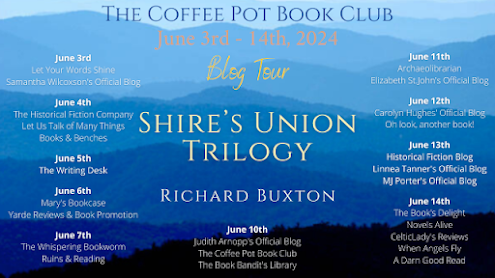
June 7, 2024
Excited to share the New Release from Tony Riches!
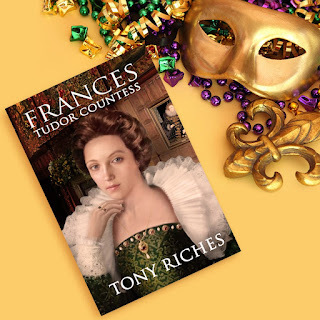
#NewRelease from Tony Riches, the next in his fabulous Elizabethan series!
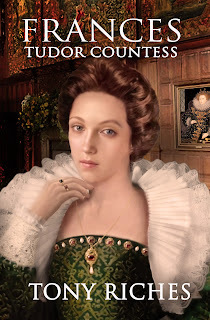
BUY NOW from Amazon UK and Amazon US
Based on extensive research, original letters and records of the Elizabethan Court, this new account explores the life of Frances Walsingham, the only surviving child of Queen Elizabeth’s ‘spymaster’ Sir Francis Walsingham.
Better educated than most men, her father arranges her marriage to warrior poet Sir Philip Sidney. After Philip is killed in battle, Frances becomes Countess of Essex, and is banished from court after her husband Sir Robert Devereaux’s rebellion against the queen. Can she marry for love, if it means turning her back on her faith and all she knows?
The story which began with the Tudor trilogy follows Frances, Countess of Essex and Clanricarde, from her first days at the Elizabethan Court to the end of the Tudor dynasty and the rise of the Stuarts.


Tony Riches was born in Pembrokeshire, West Wales and spent part of his childhood in Kenya. After gaining a BA degree in Psychology and an MBA from Cardiff University he worked as a Management Consultant, followed by senior roles in the Welsh NHS and Local Government. He wrote several successful non-fiction books before writing historical fiction and has now returned to Pembrokeshire, where he enjoys sailing and sea kayaking.
Tony has an expansive catalogue of historical fiction - check out his website here
May 21, 2024
The Coffee Pot Book club presents: Lost Women of Mill Street by Kinley Bryan
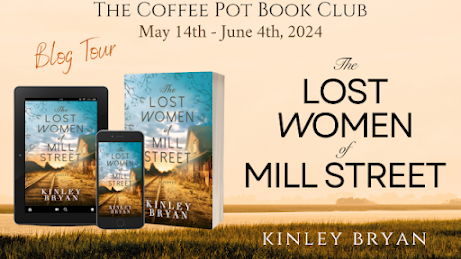
Book Title: The Lost Women of Mill Street
Series: n/a
Author: Kinley Bryan
Publication Date: May 7, 2024
Publisher: Blue Mug Press
Page Count: 300
Genre: Historical Fiction
Follow the Tour : https://thecoffeepotbookclub.blogspot.com/2024/03/blog-tour-the-lost-women-of-mill-street-by-kinley-bryan.html
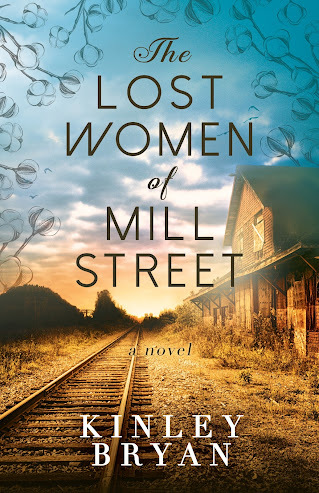
The Lost Women of Mill Street
by Kinley Bryan
1864: As Sherman’s army marches toward Atlanta, a cotton mill commandeered by the Confederacy lies in its path. Inside the mill, Clara Douglas weaves cloth and watches over her sister Kitty, waiting for the day her fiancé returns from the West.
When Sherman’s troops destroy the mill, Clara’s plans to start a new life in Nebraska are threatened. Branded as traitors by the Federals, Clara, Kitty, and countless others are exiled to a desolate refugee prison hundreds of miles from home.
Cut off from all they've ever known, Clara clings to hope while grappling with doubts about her fiancé’s ambitions and the unsettling truths surrounding his absence. As the days pass, the sisters find themselves thrust onto the foreign streets of Cincinnati, a city teeming with uncertainty and hostility. She must summon reserves of courage, ingenuity, and strength she didn’t know she had if they are to survive in an unfamiliar, unwelcoming land.
Inspired by true events of the Civil War, The Lost Women of Mill Street is a vividly drawn novel about the bonds of sisterhood, the strength of women, and the repercussions of war on individual lives.
Read an Excerpt
Clara found her place at her looms at Ivy Woolen Mill, and as she waited for the bell, she regarded the women and girls around her. Some appeared nervous and quiet. Others seemed unbothered as they chatted and laughed in small clusters. Temperance was looking at her. Clara turned around to avoid her glare.
The bell sounded and they took their places, and the machines whirred into motion with a roar.
Clara tended to her looms, replacing bobbins as they ran out of weft, her thoughts on the advancing army. Hours passed, and gray wool cloth formed on the looms before her, and then it happened: The bell tolled, far too early to signal the noonday break.
A warning bell.
The blood rushed from Clara’s hands. This was it. At first, the overseer kept the looms running, so Clara and the other weavers kept at their work. But not long after the bell tolled, a noise reverberated from somewhere outside, layered on top of the din and tremble of the power looms.
Clara regarded the others; her own wonderment reflected in their faces.
Seconds later, several doffer boys from the spinning room rushed in, shouting and pointing toward the river. A new scent mingled with the oil and sweat: woodsmoke. Clara exchanged a look with the woman across the aisle. She’d smelled it too. The overseer hurried down a long aisle toward the stairwell. The looms were still running. He returned moments later, his expression inscrutable.
Clara was anxious to see for herself what the doffers had witnessed. The machines kept running, and though she risked reprobation, she left her place and hurried to the stairwell. Several others crowded around her at the window. She let out a cry, and her hand flew to her mouth. Even though she’d suspected what it was, still it was hard to believe the sight.
Flames consumed the covered bridge. Even at this distance, the heat warmed her face. Large planks fell to the river with an unholy crash and sizzle.
A soldier in blue ran past Ivy Mill toward the bridge. The sight of Union troops was like the realization of a dream. More soldiers followed, racing down the road from town toward the river.
The Union soldiers yelled and pointed their guns across the river. On the far bank, the Roswell Battalion fired back.
“Get back inside!” the guard shouted to several doffer boys who’d run outside for a closer look at the fighting.
The day had taken on a dreamlike quality. Their mills and this sleepy town, this isolated place of hard work and no small amount of suffering, had become a battlefield. After three long years, the war had found Roswell.
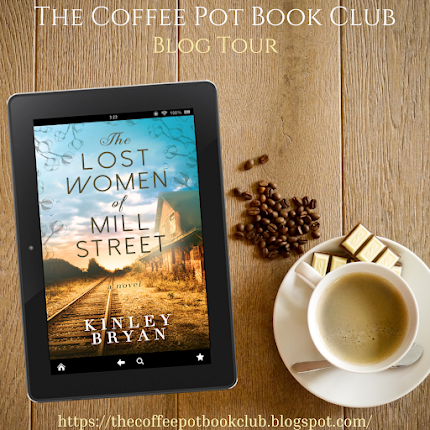

Kinley Bryan's debut novel, Sisters of the Sweetwater Fury, inspired by the Great Lakes Storm of 1913 and her own family history, won the 2022 Publishers Weekly Selfies Award for adult fiction. An Ohio native, she lives in South Carolina with her husband and three children. The Lost Women of Mill Street is her second novel.
Author Links:
Website: https://kinleybryan.com/
Twitter: https://twitter.com/kinleybauthor
Facebook: https://www.facebook.com/KinleyBryanWrites
Instagram: https://www.instagram.com/kinleybryanauthor/
Book Bub: https://www.bookbub.com/profile/kinley-bryan
Amazon Author Page: https://www.amazon.com/stores/Kinley-Bryan/author/B09J5GWDLX
Goodreads: https://www.goodreads.com/author/show/21892910.Kinley_Bryan
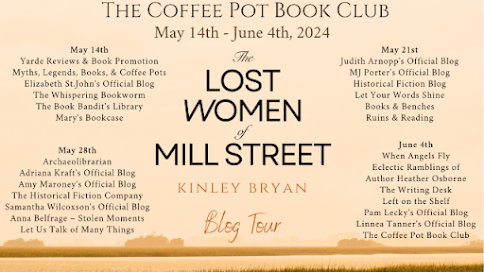
May 20, 2024
A Memory of Murder: A Fabulous New Jan Christopher Mystery by Helen Hollick
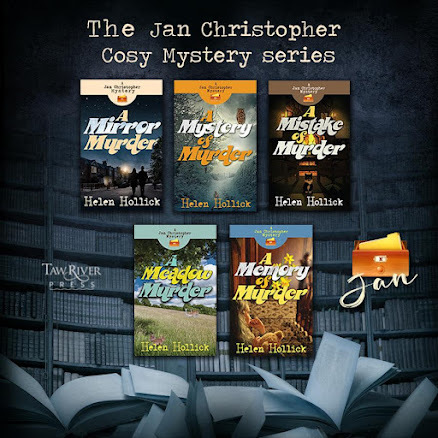
THE JAN CHRISTOPHER MYSTERIESby Helen Hollick
A Memory of Murder – a new cosy murder mystery to solve – along with library assistant Jan Christopher, her fiancé, Detective Sergeant Laurie Walker and her uncle, Detective Chief Inspector Toby Christopher.
Set in the 1970s this easy read cosy mystery series is based around the years when Helen was a north-east London library assistant, using many of her remembered anecdotes, some hilarious – like the boy who wanted a book on Copper Knickers. (You’ll have to read the first book, A Mirror Murder to find out more!)
The mysteries alternate between Jan’s hometown, and where Laurie’s parents live – North Devon, (where Helen now lives.)
In this fifth episode, there’s a missing girl, annoying decorators, circus performers, and a wanna-be rock star to deal with. But who remembers the brutal, cold case murder of a policeman?Easter 1973.
The North London library where Jan Christopher works is in upheaval because the decorators are in to spruce the place up, but there is more for her policeman uncle, DCI Toby Christopher and her fiancé, DS Laurie Walker, to worry about than a few inconvenient pots of paint.
An eleven-year-old girl has not returned home after school, and strange ‘gifts’ are being surreptitiously left for the detective chief inspector’s family to find. Could these items have anything to do with the unsolved murder, fifteen years ago, of Jan’s policeman father?
Buy Link:Amazon universal: https://mybook.to/AMemoryOfMurder
(e-book available for pre-order: published on 18th May – paperback release to follow)Or order from any bookstore (cheaper on Amazon)
About the Author

First accepted for traditional publication in 1993, Helen became a USA Today Bestseller with her historical novel, The Forever Queen (titled A Hollow Crown in the UK) with the sequel, Harold the King (US: I Am The Chosen King) being novels that explore the events that led to the Battle of Hastings in 1066. Her Pendragon’s Banner Trilogy is a fifth-century version of the Arthurian legend, and she writes a nautical adventure/supernatural series, The Sea Witch Voyages. She has also branched out into the quick read novella, ‘Cosy Mystery’ genre with her Jan Christopher Mysteries, set in the 1970s.
Her non-fiction books are Pirates: Truth and Tales and Life of A Smuggler. She is currently writing about the ghosts of North Devon for Amberley Press, and another, Jamaica Gold, for her Sea Witch Voyages.
She lives with her family in an eighteenth-century farmhouse in North Devon with their dogs and cats, while on the farm there are showjumper horses, fat Exmoor ponies, an elderly Welsh pony, geese, ducks and hens. And several resident ghosts.
Website: https://helenhollick.net/Facebook: https://www.facebook.com/helen.hollick
Blog: promoting good authors & good readshttps://ofhistoryandkings.blogspot.com/
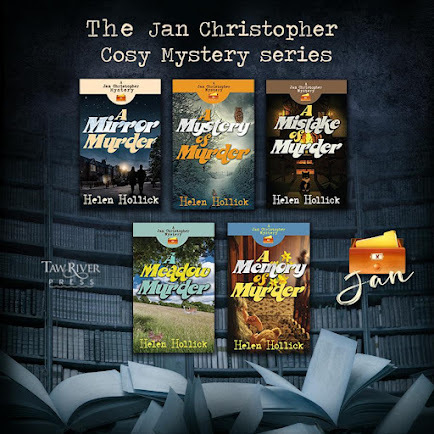
May 17, 2024
The Coffee Pot Book Club Blog Tour presents: Autumn and the Silver Moon Stallion by V P Felmlee
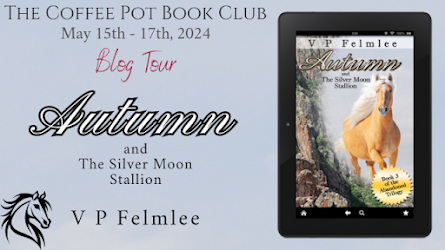
Book Title: Autumn and The Silver Moon Stallion
Series: Book 3, The Abandoned Trilogy
Author: V P Felmlee
Publication Date: November, 2023
Publisher: TCS Publishing
Page Length: 280
Genre: Young Adult / New Adult Fiction
Twitter Handle: @lilhistorian @cathiedunn
Instagram Handle: @thecoffeepotbookclub
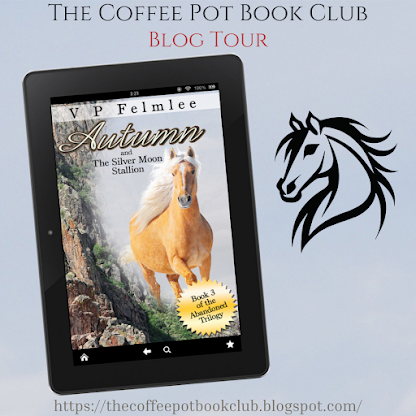

Autumn and The Silver Moon Stallion
V P Felmlee
Blurb:
An abused, neglected filly is abandoned on a remote country road, left to die. A young woman grieves the loss of her best friend, the champion horse she had built her life and future around. The heir to one of the largest ranches in Wyoming comes home to face the ire and disappointment of his grandfather. A world-renown scientist clashes with the U.S. government over a brutal, decades-long war to decide the fate of thousands of mustangs, a beloved icon of the American West. Autumn and The Silver Moon Stallion is their story of love, hatred, and death. Will their struggles give them hope to fight for their beliefs, or tear them forever apart?
Read an Excerpt
As one, Becky, Autumn, and Silver Moon looked up just in time to see a tower of water coming over the top of the canyon, right towards them.
Autumn turned to run.
Becky turned to run.
Silver Moon was still coming down the trail, watched as waves hit the ground, then rose up like a living thing several feet in the air before crashing down first on Autumn then on the girl.
More water was coming from above, splashing and crashing, ramming its way from canyon wall to canyon wall, shoving anything in its way forward, relentless and unstoppable.
Without thinking, Silver Moon jumped in.
Becky looked back, trying to see Autumn, swallowing ice-cold water in the process. She spat it out, then saw the palomino struggling to get her footing. The water was too deep, and was forcing them along at an incomprehensible speed.
Becky grasped a large boulder. She couldn't hold on to it. Her body banged against an outcrop, driving the air from her lungs.
I have to watch where I'm going, she thought, don't look back, look forward.
The filly was trying hard to get to Becky, who was just ahead of her. The water pushed her against the canyon walls, forcing her to one side, then another. Instinct took over, her legs began to move. I have to keep my head up.
She was now whale-eyed, growing more terrified with each second. She couldn't avoid the boulders and slammed into them time and again.
She began to panic.
Silver Moon was strong and big but he was almost no match for the churning maelstrom the canyon had become.
Just ahead, he saw Autumn losing the fight to keep her head up. He saw her disappear, briefly emerge, then disappear.

This title is available to read on #KindleUnlimited.

V P Felmlee is the author of The Abandoned Trilogy: Price Tadpole & Princess Clara; Good Boy Ben; and the third book in the series, Autumn and the Silver Moon Stallion. A former newspaper reporter and editor, she has a degree in geology, and has been active in historic preservation and animal welfare issues. Her articles have appeared in several magazines and she has won numerous awards.
She will be the 2025 president of Women Writing the West and lives in Grand Junction, Colorado, with her husband, two dogs, and six cats.
Author Links:
Website: www.vfauthor.com
Twitter: https://twitter.com/lilhistorian
Facebook: https://www.facebook.com/vicki.felmlee.7
Amazon Author Page: https://www.amazon.com/stores/V-P-Felmlee/author/B0BQJKNSKJ
Goodreads: https://www.goodreads.com/author/show/23381045.V_P_Felmlee
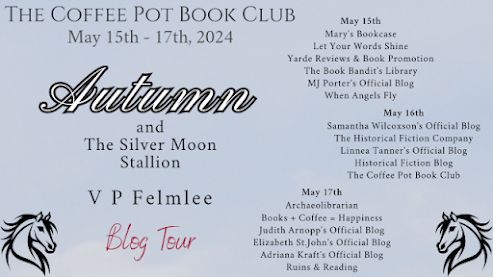
May 15, 2024
The Coffee Pot Blog Tours present: Their Castilian Orphan by Anna Belfrage
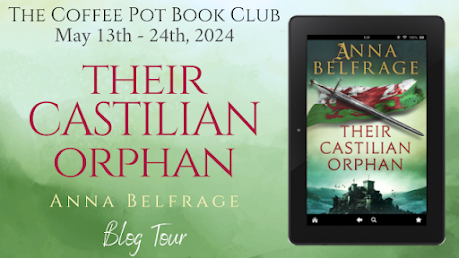
Book Title: Their Castilian Orphan
Series: The Castilian Series
Author: Anna Belfrage
Publication Date: 23 March 2024
Publisher: Timelight Press
Page Count: approx. 400
Genre: Historical Fiction, Romantic Historical Fiction, Historical Romance
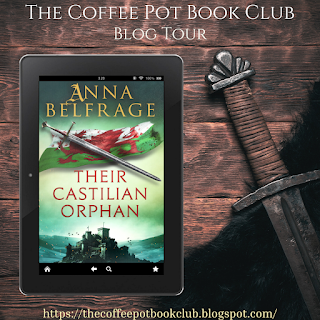

Their Castilian Orphan
by Anna Belfrage
It is 1294 and Eustace de Lamont is back in England after five years in exile. He will stop at nothing to ruin Robert FitzStephan and his wife, Noor d’Outremer.
Robert’s half brother, Eustace de Lamont, has not mellowed during his absence. He is more ruthless than ever, and this time he targets Robert’s and Noor’s foster son, Lionel.
Lionel is serving King Edward as a page when Eustace appears at court. Not only does Lionel become the horrified witness to Eustace’s violent streak, Eustace also starts voicing his suspicions about Lionel’s parentage. The truth about Lionel’s heritage is explosive—should King Edward find out, all would be lost for Robert and Noor.
In October of 1294, Wales rises in rebellion. Robert must leave his family unprotected to fight the Welsh rebels on the king’s behalf, comforted only by the fact that Eustace too is called to fight.
Except that Eustace has no intention of allowing his duty to his king—or a mere rebellion—come between him and his desire to destroy Robert FitzStephan . . .
This title is available to read on #KindleUnlimited.

Had Anna been allowed to choose, she’d have become a time-traveller. As this was impossible, she became a financial professional with three absorbing interests: history, romance and writing. Anna has authored the acclaimed time travelling series The Graham Saga, set in 17th century Scotland and Maryland, as well as the equally acclaimed medieval series The King’s Greatest Enemy which is set in 14th century England. Anna has just released the final instalment, Their Castilian Orphan, in her other medieval series, The Castilian Saga ,which is set against the conquest of Wales. She has recently released Times of Turmoil, a sequel to her time travel romance, The Whirlpools of Time, and is now considering just how to wiggle out of setting the next book in that series in Peter the Great’s Russia, as her characters are demanding. . .
All of Anna’s books have been awarded the IndieBRAG Medallion, she has several Historical Novel Society Editor’s Choices, and one of her books won the HNS Indie Award in 2015. She is also the proud recipient of various Reader’s Favorite medals as well as having won various Gold, Silver and Bronze Coffee Pot Book Club awards.
“A master storyteller”
“This is what all historical fiction should be like. Superb.”
Find out more about Anna, her books and enjoy her eclectic historical blog on her website, www.annabelfrage.com
Sign up to Anna’s newsletter to keep up with new releases, give-ways and other fun stuff: http://eepurl.com/cjgatT
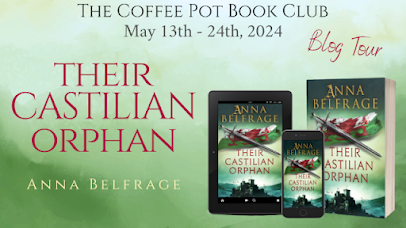
Website: www.annabelfrage.com
Twitter: https://twitter.com/abelfrageauthor
Bluesky: https://bsky.app/profile/abelfrageauthor.bsky.social
Facebook: https://www.facebook.com/annabelfrageauthor
Instagram: https://instagram.com/annabelfrageauthor
Book Bub: https://www.bookbub.com/profile/anna-belfrage
Amazon Author Page: http://Author.to/ABG
Goodreads: https://www.goodreads.com/author/show/6449528.Anna_Belfrage
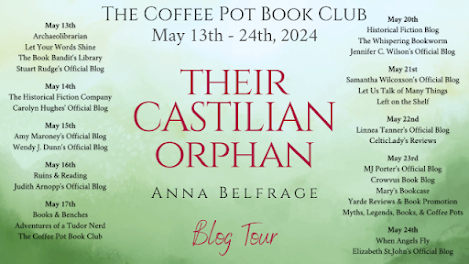
April 26, 2024
Henry VIII and the Break from Rome

Henry VIII and the Break with Rome
Judith Arnopp
There are many unanswered questions about the Tudors but probably the most asked is ‘What makes the Tudors so fascinating?’ It could be that they are seldom out of the media. There are numerous films, shows, documentaries, books, articles, websites but there seems to be no definitive answer to their appeal. We have portraits (as discussed in my previous blog which can be read here), we have records of their actions, some good, many bad. We can visit their palaces, see surviving fragments of their clothing, pieces of furniture; examples of their handwriting, craft work, letters. We even have the wreck of Henry’s favourite flag ship. So, all this considered, we should know just about all there is to know about them. But we don’t, or perhaps it would be better to say, we don’t know as much about them as we would like.
Everyone is an expert when it comes to the Tudors (myself included). We think we know them because we can recognise their faces, count off the names of Henry’s wives on our fingers, and tentatively find our way through the complexities of the Reformation. I am often asked questions about the Tudors that are impossible to answer but the most elusive of all are: ‘What made them tick?’ 'How did their minds work?' What did they think and why did they think it? My favourite question received this week is ‘What did Henry VIII really feel when he broke with Rome?’ I've been thinking about it ever since but it is one of those questions we can never really answer. Henry is so many things to so many people. A monster, a bigot, a bully ... I could go on but I prefer to try to be objective.
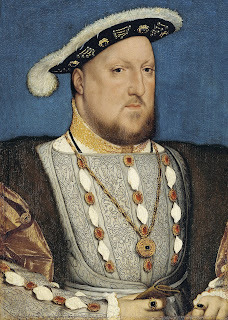
The distance between the Renaissance and the world we know today is unfathomable; even the most astute of us can never begin to really understand the workings of the Tudor mind. Religion today is, in comparison, lax. Few of us are ruled by the teachings of the church as they were then. People of the period, even kings, lived by the dictates of religion; the hours of the day were divided by bells calling them to prayer, the months were marked by feast and saint’s days. Even their diet and sex life was ruled by the church. I don’t believe we can even begin to realise the magnitude of Henry’s break with Rome or the effect it had on society, or more importantly for the purposes of this blog, the impact it had on Henry himself.
In becoming God’s representative on Earth in place of the Pope, Henry must have feared deep down that he was in fact taking one step closer to hell rather than Heaven. His deep-seated Catholic upbringing taught that the Pope was unassailable; snubbing Rome was tantamount to snubbing God himself. Henry was stubborn, he refused the directives of the Pope yet, secretly, he must have trembled. Against his religious scruple, and despite the fact that he found many facets of continental reform troublesome, he was convinced by those eager for reform that a break with Rome was the only way to secure his dynasty. To convince the people, he allowed a bible to be printed, in the vernacular.
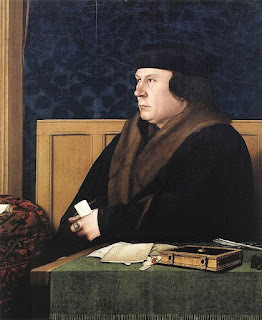
The Great Bible issued in 1539 was the first to be printed in English and we have only to turn to the frontispiece to see the change that has taken place. Gone is Christ in majesty; He is rather rudely ousted to the top margins of the page where He whispers God’s word into the King Henry’s ear. Henry, seated just below him, passes on the word of God.
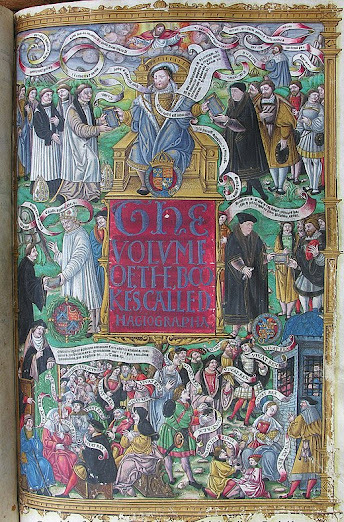
The king is holding two copies of the scriptures, he gives one into the keeping of Cranmer and one into the hands of Cromwell, who in turn pass the word to the clergy and laymen, and so on to the masses (some of whom seem to be in gaol). Comic style speech bubbles give voice to the proceedings, ‘Vivat Rex’ they cry, ‘God save the King,’ praising Henry who is now the main conduit of the word of God.
Copies of this Bible were sent to parishes across the country and Thomas Cromwell ordered one to be placed in every church in England, a crucial tool in the campaign to subliminally persuade the nation of Royal Supremacy and to follow the dictates of their king.
This frontispiece is often used as an example of Henry’s megalomania yet although it was undoubtedly designed to flatter him, he had little to do with it other than to sanction its publication. It was designed by Myles Coverdale working under commission of Thomas Cromwell, whose agenda was to promote reformation and flatter his king.
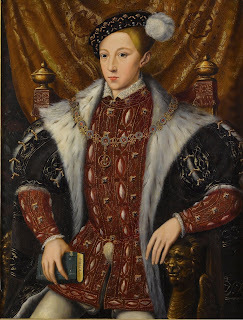 Henry took his role of Christian King seriously; he was a theologian, the one-time Defender of the Faith, a title conferred on him by Pope Leo X for a pamphlet Henry wrote against Martin Luther. Yet the lesson imprinted on him by his father, Henry VII, on the importance of heirs seems to have obliterated his religious teaching. When the Pope refused to countenance Henry’s divorce from Catherine of Aragon, Henry was cornered. He believed he had to marry Anne Boleyn and secure the Tudor dynasty by getting himself an heir. The Pope’s refusal to favour Henry’s suit made the break with Rome inevitable.
Henry took his role of Christian King seriously; he was a theologian, the one-time Defender of the Faith, a title conferred on him by Pope Leo X for a pamphlet Henry wrote against Martin Luther. Yet the lesson imprinted on him by his father, Henry VII, on the importance of heirs seems to have obliterated his religious teaching. When the Pope refused to countenance Henry’s divorce from Catherine of Aragon, Henry was cornered. He believed he had to marry Anne Boleyn and secure the Tudor dynasty by getting himself an heir. The Pope’s refusal to favour Henry’s suit made the break with Rome inevitable.Many, many innocent people died for their refusal to follow Henry’s dictates, his quest for a son with Anne failed, and the subsequent marriage to Jane Seymour bore fruit but she died shortly after bearing him a son. Even having obtained his heir Henry could not forget the untimely death of his elder brother, Arthur, a death that made Henry heir to the throne. Terrified that history would repeat itself, Henry never gave up hope of more sons but, although the king married a further three times, Edward was his last child.
Contrary to the belief of many, Henry never abandoned Catholicism. After the break with Rome he became head of the Catholic Church in England, a reformed church, that dispensed with the Pope and the monastic institutions that rivalled his magnificence in England. Henry maintained his Catholic beliefs to the end and died in the faith. Protestantism was not established in England until the reign of Henry’s much cherished son, King Edward VI. It is my belief that Henry was not eager for reform. it was Catherine he really wanted to be rid of, not Rome but the Pope left him no choice. Had the marriage to Catherine of Aragon been annulled the reformation would never have taken place during Henry's reign but the wave of religious change in Europe was unstoppable and it would have come sooner or later, with or without Henry.
Illustrations from Wikimedia commons
You can read more about the break from Rome and the dissolution of the monasteries in The Henrician Chronicle and Sisters of Arden. Click on the link for more information:
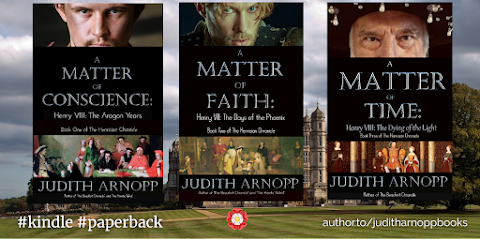

April 22, 2024
The Coffee Pot Book Club presents: A Splendid Defiance by Stella Riley

Book Title: A Splendid Defiance
Series: Roundheads & Cavaliers
Author: Stella Riley
Publication Date: 6th December 2012
Publisher: Stella Riley
Page Length: 371 pages
Genre: Historical Fiction / Historical Romance
Special Tour Price: Ebook £1.95 / US $1.95 (and equivalent) for the duration of the tour!

A Splendid Defiance
Stella Riley
Audiobook performed by Alex Wyndham
Blurb:
For two years England has been in the grip of Civil War. In Banbury, Oxfordshire, the Cavaliers hold the Castle, the Roundheads want it back and the town is full of zealous Puritans.
Consequently, the gulf between Captain Justin Ambrose and Abigail Radford, the sister of a fanatically religious shopkeeper, ought to be unbridgeable.
The key to both the fate of the Castle and that of Justin and Abigail lies in defiance. But will it be enough?
A Splendid Defiance is a dramatic and enchanting story of forbidden love, set against the turmoil and anguish of the English Civil War.
Enjoy an excerpt
Abby storms the castle
Considering that he had left his bed to dress hurriedly and come straight downstairs, the Captain’s room was remarkably tidy. A lot tidier, thought Abigail, with a faintly shocked sideways glance, than he was himself. It was also larger than she had expected, being situated at the top of the south-east turret and reached by means of a narrow spiral stair.
I shouldn’t be here, thought Abigail, in sudden panic. Jonas will kill me if he finds out.
Justin deposited his sword in a corner. Then, turning to pull the bedclothes into some semblance of order, he told her to sit down and demanded again to be informed what she wanted of him.
Abigail hovered and hesitated.
‘For God’s sake!’ exclaimed Justin, dropping irritably upon the bed and regarding her with acute disfavour. ‘Sit down and stop being coy. I’m not in the mood for it.’
She obeyed him rather quickly. ‘I’m sorry.’
‘Don’t be sorry. Just come to the point.’
His tone made this difficult but she did her best.
‘It’s my brother. He was arrested in the Market Place this afternoon – but he didn’t do anything. I mean, he wasn’t involved in the fighting in the way that others were. So I came to ask you to please let him come home.’
Comprehension dawned slowly and the blurred gaze registered astonishment.
‘You mean he was taken for rioting? No, no. It’s too good to be true.’
Abigail stiffened. ‘I’m afraid I don’t find it funny.’
The dark brows soared and his reply was deliberately blighting.
‘My dear child, I’d be amazed if the members of your household found anything funny. Quite apart from your religious persuasion, your appalling brother and his sour-faced wife are enough to kill anyone’s sense of humour. However. If you’ve hauled me out of bed just to ask a favour for Jonas, I can only say that your nerve outstrips your intelligence. To put it bluntly, I don’t care if he rots.’
Abigail dissected this remarkable speech before brushing it aside.
‘What has Jonas to do with it? It isn’t him you’ve got.’ And then, staring at him, ‘Is that what you thought?’
‘Not being on intimate terms with your entire family, what else was I to think?’ he asked acidly. ‘Well?’
‘I’m sorry. I thought you’d realise …’ She paused. ‘If it was Jonas, I wouldn’t be here.’
‘And I am supposed to know that because …?’ Captain Ambrose leaned back, brooding on her over folded arms. ‘Mistress Radford. My patience, as you may have noticed, is extremely limited and diminishing by the second. Will you please tell me, in plain language, just who the hell it is you came to rescue?’
Universal Buy Link: https://books2read.com/u/bPzVNd
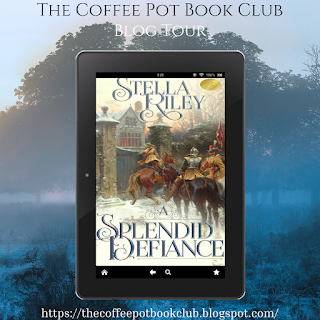

Winner of four gold medals for historical romance and sixteen Book Readers’ Appreciation Medallions, Stella Riley lives in the beautiful medieval town of Sandwich in Kent.
She is fascinated by the English Civil Wars and has written six books set in that period. These, like the 7 book Rockliffe series, the Brandon Brothers trilogy and, most recently The Shadow Earl, are all available in audio, performed by Alex Wyndham.
Stella enjoys travel, reading, theatre, Baroque music and playing the harpsichord. She also has a fondness for men with long hair - hence her 17th and 18th century heroes.
Author Links:
Website: https://stellarileybooks.co.uk
Twitter: https://twitter.com/RileyStella
Facebook: https://www.facebook.com/stellariley.books
Instagram: https://www.instagram.com/stellarileybooks/
Pinterest: https://www.pinterest.co.uk/riley9631/stella-riley-books/
Book Bub: https://www.bookbub.com/authors/stella-riley
Amazon Author Page: https://www.amazon.co.uk/Stella-Riley/e/B0034PB7UU/
Goodreads: https://www.goodreads.com/book/show/40487661-a-splendid-defiance

April 15, 2024
The Coffee pot Book Club Blog Tour is pleased to present: Yellow Bird's Song by Heather Miller
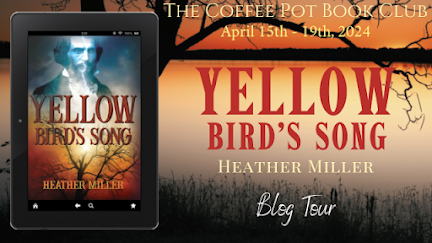
Book Title: Yellow Bird’s Song
Series: n/a
Author: Heather Miller
Publication Date: March 19th, 2024
Publisher: Historium Press
Pages: 370
Genre: Historical Fiction, Native American Studies, Western, Biography
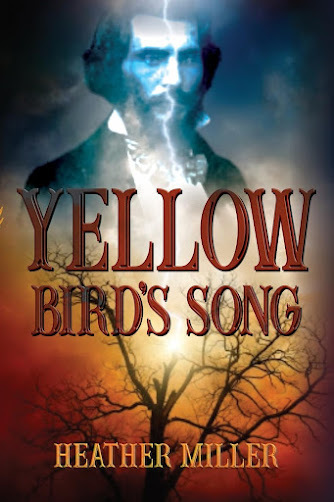
Yellow Bird’s Song
by
Heather Miller
Rollin Ridge, a mercurial figure in this tribal tale, makes a fateful decision in 1850, leaving his family behind to escape the gallows after avenging his father and grandfather’s brutal assassinations. With sin and grief packed in his saddlebags, he and his brothers head west in pursuit of California gold, embarking on a journey marked by hardship and revelation. Through letters sent home, Rollin uncovers the unrelenting legacy of his father’s sins, an emotional odyssey that delves deep into his Cherokee history.
The narrative’s frame transports readers to the years 1827-1835, where Rollin’s parents, Cherokee John Ridge and his white wife, Sarah, stumble upon a web of illicit slave running, horse theft, and whiskey dealings across Cherokee territory. Driven by a desire to end these inhumane crimes and defy the powerful pressures of Georgia and President Andrew Jackson, John Ridge takes a bold step by running for the position of Principal Chief, challenging the incumbent, Chief John Ross. The Ridges face a heart-wrenching decision: to stand against discrimination, resist the forces of land greed, and remain on their people’s ancestral land, or to sign a treaty that would uproot an entire nation, along with their family.
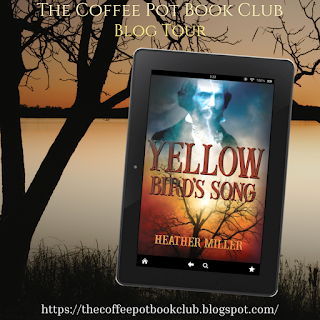
A excerpt from Yellow Bird’s Song
John Rollin Ridge, Cherokee Nation West, 1850
The evening’s red sky horizon stretched its wide arms behind Judge Kell’s dogtrot, extending into the dust. A dead tree stood as an ineffectual sentry between his corn crib and smokehouse, visible through the open-framed breezeway. I salivated, smelling pork fat lingering in the air. No longer able to afford to slaughter hogs, my family could only recall bacon’s salty taste.
Inside the paddock, my appy lay on his side. Castration’s fresh blood tainted his coat of bronze and cream. Blood gathered under his hind quarters. If Kell had cut his femoral, he’d die from blood loss. That horse was Dick’s grandson, the pony I begged Papa to bring west from Running Waters.
The porch door squeaked, then slammed behind him. Kell expected me. He rolled tobacco in paper, sealing it closed with his tongue. His eyes squinted from the western prairie’s sunlight sliding low behind me.
He struck a phosphorus match against the porch post, lit the end of the rolled tobacco, held it in his lips, tilted his head to the side, and inhaled. Through smoke, he said, “Look at you, Rollin, standing on my land like some Mexican bandit. I believe your post is south of here.” Kell’s sarcasm snarled like poisoned saliva foaming from the jaw of a rabid dog.
“I’m in the right place,” I said, more confidently than I felt, flying on vindication’s wind alone.
“That is where you and I agree. Not much else, but that singular point.”
He sauntered, with spotless leather boots, to the edge of the steps extending into the western dirt, just dust over the granite under Indian land.
I nodded left toward his painted paddock fence. “Kell, you take my Appaloosa stallion? His markings are unmistakable.”
Kell gestured with his smoking hand, pointing the two fingers toward my injured animal. “You mean that gelding?”
“Who made him so?”3
“I did and am willing to stand by my deeds with my life.4 Found him in pastureland. Horse bucked and rammed me. Without balls, he’ll settle right down.”
“As a judge, you should know Cherokee don’t own open tribal land. No reason he should be here.”
Judge Kell gripped his porch rail but remained atop its planks on the high ground. Then, his unoccupied, dominant hand recognized his bowie knife’s handle, sheathed, and slung low on his hip. He said, “Can testify to nothing.”
His lies didn’t dampen my resolve. I saw through him. We both knew the real reason I was there. I shouted, “My sister can.”
He leaned against his porch post with carefree nonchalance. “The deaf and dumb sister? I don’t know what that feeble-minded woman could mean.”
I touched the leather strap of Clarinda’s whistle around my neck. “She doesn’t need to speak to witness. She is a medicine woman.” Then I separated my boots, furthering my stance against the inevitable explosion of powder and ball from the iron under my palm.
Kell scoffed. “Then remind me to stay well. That woman’s a witch.”
Wouldn’t be illness that killed him. I couldn’t allow Kell’s wit to move me to fire first, no matter what insults he hurled at my sister. To make justice legal, Kell must first try to take my life, although that didn’t mean I couldn’t provoke the inevitable.
I matched his sarcasm. “Now isn’t the time to insult my family. Come down off that porch. Clarinda and Skili followed you, saw what you did. You’ve cost me far more than future foals. That blade in your grip took my father’s life.”
I spoke the Cherokee words fast, having memorized their phrases from a thousand daydreams. Still, this time, the words echoed in the abandoned cave of my chest with heavier resonance—measuring the phrase’s increased weight by speech.
He spoke his smug reply through smoke. “Your father’s signature on that treaty stole nearly four thousand Cherokee souls. So, I believe, son, both that horse and your father,” he smiled before finishing his thought, “got what they deserved.”
“According to whom? Your justice? Chief Ross’? It’s his bloody hands you’re hiding.”
Kell pulled a rogue piece of tobacco off his tongue with his thumb and pointer finger. “See now, truth rests in each man’s perception. Your father knew that, at least.”
“Papa understood Cherokee sovereignty could not exist in the East. My family stood in the way of Chief Ross’ greed; Ross sent you to kill him for it.”
Kell’s searing sarcasm furthered his attempt at intimidation. He shook his head, clicking his tongue. “By accusing Chief Ross of such crimes, you make a steep accusation for a raven so young.” But then, his snide tone became more cynical. “Your family received lawful Cherokee blood vengeance. So’s I heard.”
It wasn’t only his voice; every crack of bare earth mocked me. But what he didn’t know, what the ground couldn’t predict, was that this time, his blood would run. Cherokee Nation’s rocky soil would soak in it, dilute him in its groundwater, and spit his remnants through every winding river and well.
Kell offered an aside, turning his face from me. “You’re still breathing.” He looked back, continuing his threat with closed-tooth menace. “When this knife reaches you, that’ll end. How ironic—” He stopped short, mid-thought, and exhaled a chuckle before inhaling again from his lit tobacco. His eyes looked at me from my worn boots to my mother’s pale eyes.
I finished the sentiment on his behalf, “That the same knife would assassinate a father and murder his son? Admit your part. You were there in ‘39; the same knife hangs at your side.”
Kell unsheathed and admired the blade in his hand as if he hadn’t seen his distorted reflection in it for years. “She’s a beautiful weapon, don’t you think? Buckhorn handle. Metal inside the bone. Streamlined and strong. Son, this weapon ended many a man’s life with its peaceful vengeance.”
I barked, “Vengeance is a fickle whore. She strains her rulings through a sieve she calls morality, leaving behind rocks and politics. Justice’s bullet is fair and fast. Even blindfolded, her shooter doesn’t have to stand close to hit where he’s aiming.”
Years ago, the image of Kell’s bowie knife forged in my mind. Its craftsman burned the bone handle with the image of an arrowhead—no shaft, no flight feathers—only a killing point. Kell’s knife required wind and aim, powered by his quick reach, and forged will. My twelve-year-old eyes remembered his blade. At twenty-two, my memory dripped in images of Papa’s blood.
Impatient and blinded by the reddening dusk, Kell spoke with vigorous staccato, hefting his significant weight down the stairs. “Take your thumb off that trigger, boy, before you start a war.” Then, with sight restored, he dirtied his spotless boots, kicking a wandering rat snake slithering between us, seaming a dividing line in prairie dust.
I shook my head in disgust. “War began ten years ago. Your whiskey breath is as rancid as your soul. I can smell it stronger now.” I studied his smirk, offering my own in exchange. “Stinks so bad, I thought someone died.”
Kell and I stood in paradox: I, in the shadow of a tree, him in the dying sunlight. His age to my youth, wealth to my poverty, appointment to my banishment, and vengeful intent opposing my righteous confidence.
He cocked his head and smirked, glanced over to my horse, and crushed the remnants of his smoke into the dust. “You think this will end with you? Cousin Stand leading your teenage brothers and Boudinot’s boy against my grown sons and Chief Ross’ men in some unsanctioned feud? The few against the many?”
“No, justice ends with me. If you approach, you will lose your life.”5 I wouldn’t retreat from his taunts, knowing them for what they were. If Cousin Stand and I took down Chief Ross, it wouldn’t be a feud; it would escalate an already brewing Cherokee civil war.

As a veteran English teacher and college professor, Heather has spent nearly thirty years teaching her students the author’s craft. Now, with empty nest time on her hands, she’s writing herself, transcribing lost voices in American’s history.
Website: https://www.heathermillerauthor.com
Twitter: https://twitter.com/HMHFR
Facebook: https://facebook.com/HMillerAuthor
TikTok: https://www.tiktok.com/@heathermillerauthor
Pinterest: https://www.pinterest.com/jhjewmiller/yellow-bird/
Amazon Author Page: https://www.amazon.com/stores/author/B094DLCL8K
Goodreads: https://www.goodreads.com/author/show/21805281.Heather_Miller
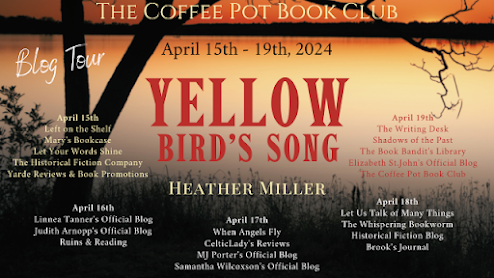
April 8, 2024
The Coffee Pot Book club welcomes The Darlington Bride by Rosemary Griggs
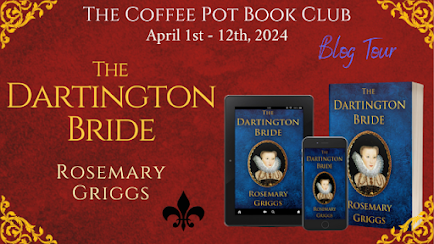
Book Title: The Dartington Bride
Series: Daughters of Devon
Author: Rosemary Griggs
Publication Date: 28th March 2024
Publisher: Troubador Publishing
Page Count: ~ 368 pages
Genre: Historical Fiction

The Dartington Bride
Rosemary Griggs
Audiobook narrated by Rosemary Griggs
1571, and the beautiful, headstrong daughter of a French Count marries the son of the Vice Admiral of the Fleet of the West in Queen Elizabeth’s chapel at Greenwich. It sounds like a marriage made in heaven...
Roberda’s father, the Count of Montgomery, is a prominent Huguenot leader in the French Wars of Religion. When her formidable mother follows him into battle, she takes all her children with her.
After a traumatic childhood in war-torn France, Roberda arrives in England full of hope for her wedding. But her ambitious bridegroom, Gawen, has little interest in taking a wife.
Received with suspicion by the servants at her new home, Dartington Hall in Devon, Roberda works hard to prove herself as mistress of the household and to be a good wife. But there are some who will never accept her as a true daughter of Devon.
After the St Bartholomew’s Day Massacre, Gawen’s father welcomes Roberda’s family to Dartington as refugees. Compassionate Roberda is determined to help other French women left destitute by the wars. But her husband does not approve. Their differences will set them on an extraordinary path...
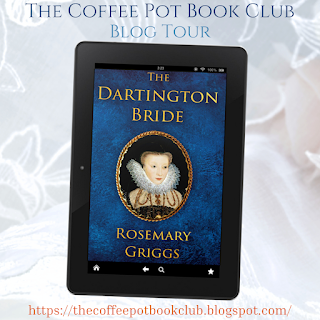
Read an Excerpt
Chapter Seven
Betrothal
Spring 1571
In the month of May, as nodding bluebells carpeted our orchards, Sir Arthur Champernowne came to Ducey. He came alone.
I waited on the doorstep behind my parents as the red-faced Englishman dismounted and swaggered between the ranks of the soldiers Alain du Bois had drilled into a guard of honour.
‘But where is his son?’ I faltered, my voice no more than a breath. ‘Where is Gawen Champernowne? Where is the man I am to wed? The man I must serve till the end of my days?’
‘Hush,’ Maman hissed.
‘But, Maman! Can’t he even find the time to attend his own betrothal?’ My stomach was clenched into a ball and it was a struggle to keep my voice down. ‘Is it really to be a betrothal without a bridegroom?’
‘We still have a lot to discuss with Sir Arthur,’ Maman whispered over her shoulder. ‘Your father would have the wedding in England in the presence of the English queen.’
I choked back a little bark of laughter. I had always known that I would be bait in a trap to secure a wealthy husband who would bring lands and fortune to my family, or a military alliance to defeat our foes. That was the lot of all well-born girls. But my parents were setting a snare to catch bigger game, royal game. They hoped to use my marriage to the son of the Vice Admiral of the Fleet of the West to secure Queen Elizabeth’s support for the wars of religion in France.
I felt my fingernails digging into my palms and my throat hurt as I gulped down angry tears. But I had been well schooled from birth. As Sir Arthur reached the steps, kissed my mother’s hand and made his bow to me, I turned on my brightest smile. The corners of my mouth ached with the effort of it and inside I was seething. But I dipped a respectful curtsey and smiled sweetly as I raised my eyes to study the face of the man who might soon be my father-in-law.
In his youth Sir Arthur must have been a handsome man. A faint echo of the gorgeous Henry Champernowne lingered in what must once have been finely chiselled features and a head held high. His abundant brown hair, swept back from a lofty forehead, showed only a trace of grey near the ears. I was cheered to see a crinkled map of laughter lines around his eyes; he must be a man of generally good humour. But for all that I thought I could detect a hint of sorrow, something world-weary, in the striking blue eyes Sir Arthur fixed on me.
‘Mademoiselle Gabrielle,’ he said in excellent French. ‘The reports of your beauty hardly do you justice. My son will be a lucky man indeed to have you at his side.’ The look he gave me said more than the gallant, courtly remark. I knew I must accept it. This was the way of our world. A girl like me must expect to be appraised as if she was a prize mare.
I murmured the appropriate response then, on a whim, added ‘Sir! It would give me pleasure if you would call me Roberda, as my family do.’ Maman looked at me askance but Sir Arthur smiled and nodded.
I followed the party inside and the Englishman accepted a glass of Papa’s finest red wine. I stepped back and watched the show of bonhomie unfold. Sir Arthur Champernowne cut a fine figure, dressed to impress, throwing back his wine and laughing with Papa. I hid a little smile behind my hand. His fine black velvet doublet was strained across an ample girth. It was quite apparent that Sir Arthur Champernowne didn’t need to add much padding to achieve a stylish peascod belly.
My parents spared no expense. The tastiest dishes our kitchen could offer were served on silver platters. We drank fine wine from exquisite Venetian glassware. Gilles, Suzette and little Gabriel all appeared dressed in their best. Jacques and Gedeon, recalled to lend their presence to the festivities, talked about ships and arms and battles with Sir Arthur. When his nephew Henry was mentioned I saw a shadow cross Sir Arthur’s face.
Pierre accompanied me as I sang a French chanson. My protégé had moved on from the fife and was accomplished on many instruments, but especially the lute. A truly gifted musician, Pierre; you could tell he felt the music in his very soul. He ended our duet with a flourish of top notes and I looked up.
‘Bravo! Bravo!’ cried Sir Arthur, clapping his hands together. ‘That’s reminded me of happy times at the Court House in Modbury. My father kept a fine troop of musicians there. You sing well, mademoiselle, and the boy plays well. Perhaps, if your father will allow, he may come to England with you when you become Gawen’s wife? His music would be welcome in our hall at Dartington.’ Now that would be a fine thing, I thought, for I will have but few friendly faces about me in that foreign place.
As the evening shadows lengthened Sir Arthur was shown to the best chamber and I spent a fitful night full of fears for my future with the as-yet-unknown Gawen.
Next day we rode to the hunt – another opportunity to show me off as a potential bride. I must admit I cut quite a dash with a new saddlecloth sent from Paris which meant I could ride side-saddle just like Queen Catherine.
Papa’s huntsman ensured that a fine stag appeared well within bowshot, and Sir Arthur loosed his arrow and found the mark. It was, of course, courteous to allow our guest the privilege of taking his prize, but I always felt a tug of sorrow to see such a noble beast fall. I looked away as the stag was dispatched and stowed on the pack pony. As we made our way homewards, Jacques and Gedeon were loud in their congratulations so I pushed on to get a little distance between us. But as I walked my horse beneath the beech trees a smiling Sir Arthur trotted up and drew his mount alongside mine.
‘It’s good to see that you ride so well and enjoy the hunt,’ he exclaimed with real warmth in his voice. ‘At Dartington, where it is my hope you will enjoy many happy years with Gawen, we have a well-stocked deer park. You will be able to hunt as often as you please.’ I merely nodded, realising I knew nothing of the home where I might soon be mistress. Maman had been there but she’d told me little of what lay in store for me. My mind raced through wild images of the sort of place it might be. As if he read my thoughts, Sir Arthur continued.
‘Dartington was built for the half-brother of a king. In his day John Holland had one of the grandest, one of the largest halls in all England. Of course that was many years ago. But you’ll sit in that great hall built to entertain royalty. And in case you’re worried it’s old fashioned, Mary and I added new chambers and laid out pleasure gardens. It’s a pretty spot, high above the River Dart and surrounded by our green Devon hills. I’m sure you’ll be happy at Dartington.’
‘Sir,’ said I, emboldened by his kindness. ‘I have not yet met your son. Will he come here to meet me while you come to agreement with my parents?’
Sir Arthur regarded me solemnly as if weighing up his options.
‘He is on the sea, doing our queen’s work. Even as we speak he is entrusted to carry a letter from the Queen of Navarre to Queen Elizabeth,’ he answered at last. ‘He’s a fine boy. You will do well together.’ The last was said with such determination as if by saying it out loud he could make it so. My worries were certainly not set at rest.
 Author and speaker Rosemary Griggs has been researching Devon’s sixteenth-century history for years. She has discovered a cast of fascinating characters and an intriguing network of families whose influence stretched far beyond the West Country and loves telling the stories of the forgotten women of history – the women beyond the royal court; wives, sisters, daughters and mothers who played their part during those tumultuous Tudor years: the Daughters of Devon.
Author and speaker Rosemary Griggs has been researching Devon’s sixteenth-century history for years. She has discovered a cast of fascinating characters and an intriguing network of families whose influence stretched far beyond the West Country and loves telling the stories of the forgotten women of history – the women beyond the royal court; wives, sisters, daughters and mothers who played their part during those tumultuous Tudor years: the Daughters of Devon. Her novel A Woman of Noble Wit tells the story of Katherine Champernowne, Sir Walter Raleigh’s mother, and features many of the county’s well-loved places.
Rosemary creates and wears sixteenth-century clothing, a passion which complements her love for bringing the past to life through a unique blend of theatre, history and re-enactment. Her appearances and talks for museums and community groups all over the West Country draw on her extensive research into sixteenth-century Devon, Tudor life and Tudor dress, particularly Elizabethan.
Out of costume, Rosemary leads heritage tours of the gardens at Dartington Hall, a fourteenth-century manor house and now a visitor destination and charity supporting learning in arts, ecology and social justice.
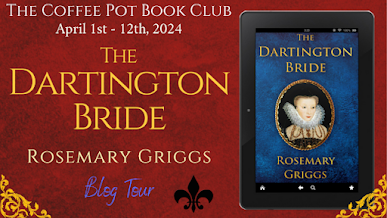
Website:https://rosemarygriggs.co.uk/
Twitter: https://twitter.com/RAGriggsauthor
Facebook: https://www.facebook.com/ladykatherinesfarthingale
Instagram: https://www.instagram.com/griggs6176/
Threads: https://www.threads.net/@griggs6176
Bluesky: https://bsky.app/profile/ragriggsauthor.bsky.social
Amazon Author Page: https://www.amazon.com/stores/Rosemary-Griggs/author/B09GY6ZSYF
Goodreads: https://www.goodreads.com/author/show/21850977.Rosemary_Griggs
